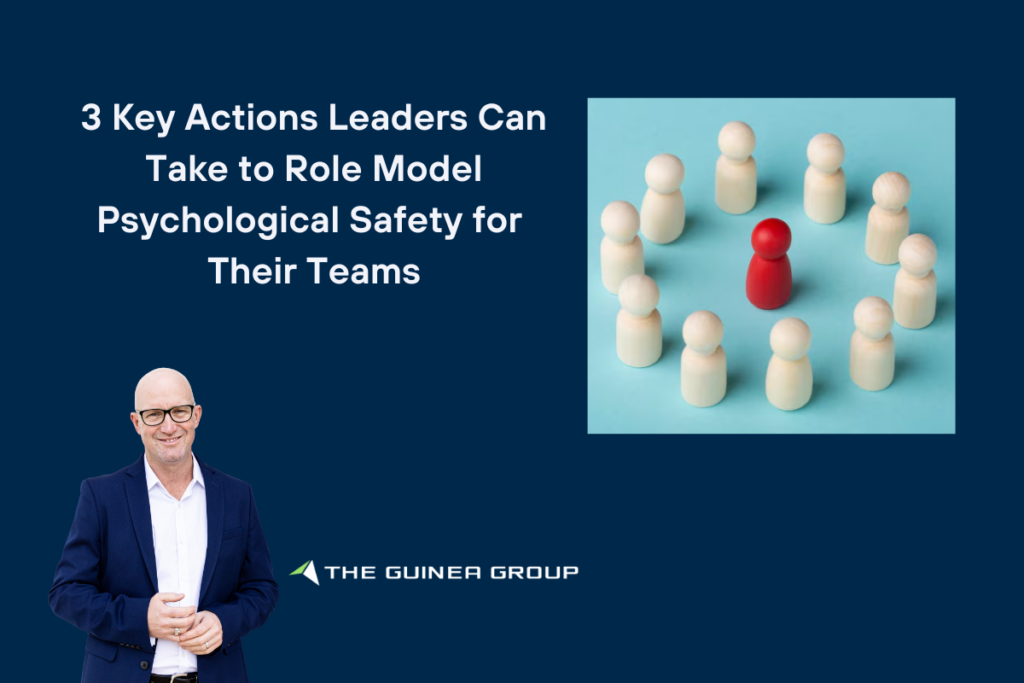Anton Guinea
Entrepreneur, Speaker, bestselling author, and founder of The Guinea Group of Companies. For over 15 years, Anton has helped leaders move their teams to become psychologically safe, physically safe and overall better versions of themselves.

3 Key Actions Leaders Can Take to Role Model Psychological Safety for Their Teams

Team members are an important part of the Psychological safety process. But so are Leaders.
Leaders play a pivotal role in creating and maintaining a culture where team members feel safe to express their ideas, take risks, and be their authentic selves.
But what does it truly mean to role model psychological safety, and how can leaders effectively embody it? Here are three key actions leaders can take:
1. No hidden agendas
Open and honest communication is the cornerstone of psychological safety. Leaders can set the tone by being transparent about their thoughts, decisions, and even uncertainties. This openness encourages team members to do the same, knowing that their contributions are valued and respected.
Action Steps:
- Share your decision-making process with your team, including the rationale behind choices and any challenges faced.
- Regularly check in with team members and invite them to share their thoughts and feedback without fear of retribution.
- Acknowledge mistakes or areas of improvement openly, demonstrating that it’s okay to be imperfect and that learning is a continuous process.
2. Get and give feedback
Leaders who actively seek and welcome feedback from their teams demonstrate that every voice matters. Constructive feedback, both given and received, is a vital part of a psychologically safe environment. It helps team members grow and innovate while ensuring that diverse perspectives are heard and valued.
Action Steps:
- Create regular opportunities for team members to provide feedback, whether through structured meetings, anonymous surveys, or informal conversations.
- Show appreciation for all feedback, even when it’s critical, by responding thoughtfully and taking action where needed.
- Model how to give feedback by focusing on behaviours and outcomes rather than personal attributes, ensuring the dialogue remains respectful and productive.
3. Demonstrate deep understanding
Empathy is a powerful tool for building trust and psychological safety within a team. Leaders who demonstrate understanding and compassion for their team members’ experiences create a supportive environment where individuals feel safe to express their concerns and challenges.
Action Steps:
- Take the time to listen actively to your team members, showing genuine interest in their well-being and professional growth.
- Offer support when team members face challenges, whether personal or professional, and help them navigate these obstacles.
- Celebrate successes and acknowledge the hard work of your team, reinforcing that their efforts are recognized and valued.
Conclusion
Psychological safety is not a one-time initiative but an ongoing commitment that leaders must actively nurture. By practicing transparent communication, encouraging constructive feedback, and demonstrating empathy, leaders can create a culture where everyone feels safe to contribute their best ideas and selves. In doing so, they not only foster a more innovative and resilient team but also set the stage for long-term success and satisfaction in the workplace.
Please click the image below if you’d like to chat about what leadership means to you

If you would like to learn more about Anton or The Guinea Group, please click here to book into Anton’s calendar, to:
UPGRADE your Mindset
UPSKILL your Leadership
UPLIFT your Teams
About Anton
Anton has dedicated his working life to helping leaders to upgrade their mindset, upskill their leadership, and uplift their teams! With a focus on helps leaders to better lead under pressure. Anton is an entrepreneur, speaker, consultant, bestselling author and founder of The Guinea Group. Over the past 19 years, Anton has worked with over 175+ global organisations, he has inspired workplace leadership, safety, and cultural change. He’s achieved this by combining his corporate expertise, education (Bachelor of HR and Psychology), and infectious energy levels.
Work With Anton!
Subscribe to our Newsletter